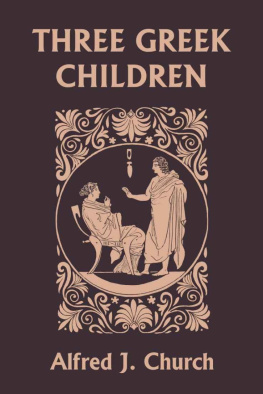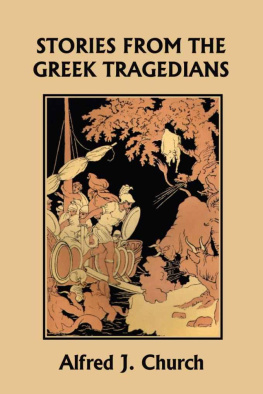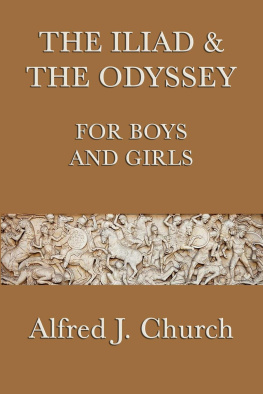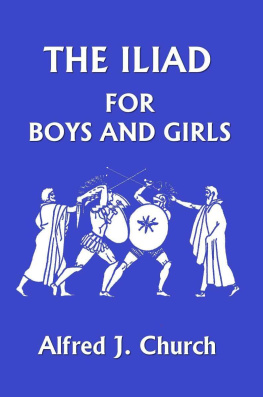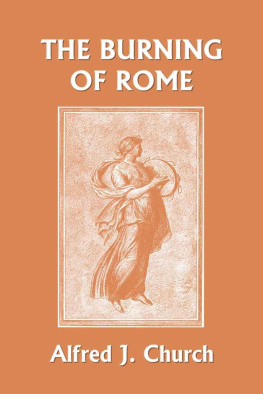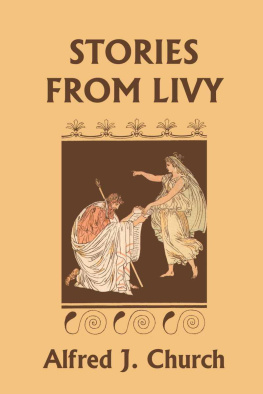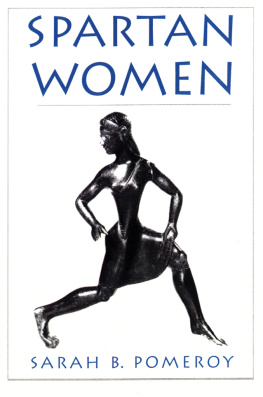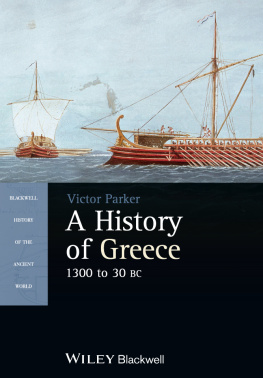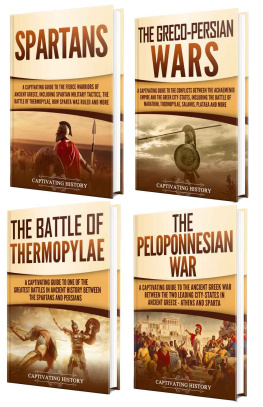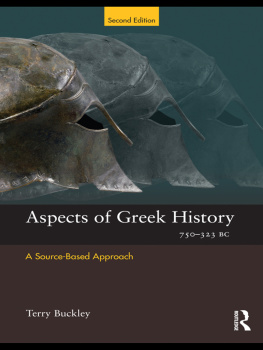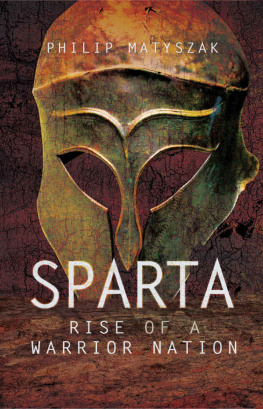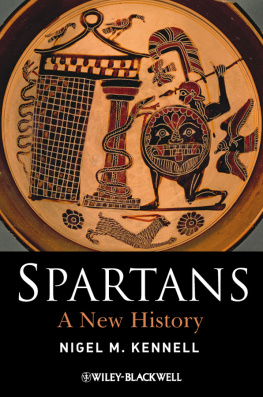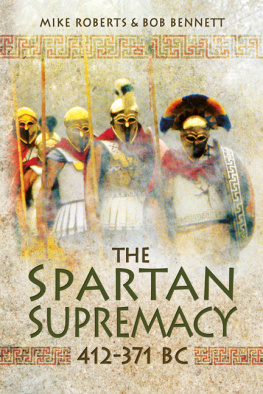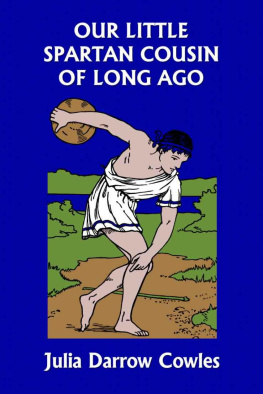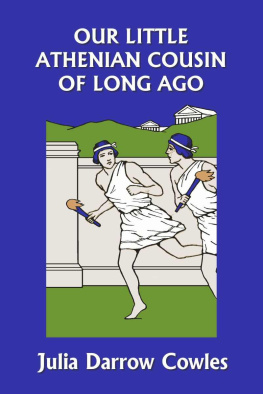Three Greek Children
by
Alfred J. Church
Yesterday's Classics
Chapel Hill, North Carolina
Cover and Arrangement 2010 Yesterday's Classics, LLC
All rights reserved. No part of this book may be reproduced or retransmitted in any form or by any means without the written permission of the publisher.
This edition, first published in 2010 by Yesterday's Classics, an imprint of Yesterday's Classics, LLC, is an unabridged republication of the work originally published by G. P. Putnam's Sons in 1889. This title is available in a print edition (ISBN 978-1-59915-081-9).
Yesterday's Classics, LLC
PO Box 3418
Chapel Hill, NC 27515
Yesterday's Classics
Yesterday's Classics republishes classic books for children from the golden age of children's literature, the era from 1880 to 1920. Many of our titles are offered in high-quality paperback editions, with text cast in modern easy-to-read type for today's readers. The illustrations from the original volumes are included except in those few cases where the quality of the original images is too low to make their reproduction feasible. Unless specified otherwise, color illustrations in the original volumes are rendered in black and white in our print editions.
Contents
CHAPTER I
The Home in Athens
I AM going to tell you about some Greek children, who lived more than two thousand years ago in a city called Athens. The city stands still, and the ruins of many of its old buildings are to be seen. Most of these buildings were temples, in which the people used to worship their many gods. There was Phbus, the sun-god; and Hera, the goddess of power; and Athen, the goddess of wisdom; and Demeter, or mother-earth. For they did not know, as did the Jewswho had, you will remember, but one temple,that there is but one God from whom all good things come down to men. Athens was one of the richest and most beautiful cities in the world, and very powerful too; only at the particular time of which I am writing the people were in great distress. Their enemies sent an army every year into their country, and shut them up in their walls during all the spring and summer time. Thousands and thousands more than the city could properly hold were crowded into it; numbers of people had no houses to live in, and had to do as best they could under carts tilted up, and even in great barrelsany thing that could give them shelter. Even the rich felt this trouble very much, and especially the children, who had no out-door games; for the streets were, of course, not fit for them to play in, and they got sadly tired, in the hot days, of being always shut up in their nurseries.
It is a very hot day in July, and the three children I am going to tell you about are feeling very tired and, I am afraid, a little cross. There are two girls, Gorgo and Rhodium (Rhodium means Little Rose ), and a boy, Hipponax (which is in English Horse King ). Gorgo and Rhodium are playing with dolls, not made of wax or wood, like our English dolls, but of clay, and painted to make them look like soldiers, sailors, and merchants, or ladies finely dressed, or working women. Gorgo, who is the elder of the two girls, likes soldier dolls, and has divided hers into two little armies. One army she calls Spartans (the Spartans were the enemies who were shutting up the people in the walls), and the other Athenians. She sits on the floor and rolls a ball, first into one army and then into the other. I don't think that she rolls it quite fairly, for more of the Spartans are upset than of the Athenians. Gorgo is just ten years old. Her sister, who is four years younger, does not care about soldier dolls, but is never tired of playing at mother, nurse, and child, with the three dolls which her own nurse has dressed up for her. Hipponax, who is four, is amusing himself with a cockchafer, which one of the servants has caught for him. It has got a thread tied round it, and he holds the other end of the thread in his hand and lets it fly about the room. This is a rather cruel game, and the sisters seem to think so, for when the little boy runs out of the room to get a drink of water, Gorgo says to Rhodium: "I do wish that tiresome child would find something else to play with besides these wretched cockchafers. They do make such a nasty buzzing, and, besides, they fly up against one's face, and I don't like the feel of them at all. And I am sure they must be very unhappy. I shall cut the thread while he is away, and let the poor thing go."
"Oh! But he will be so angry," said Rhodium, who is a timid, peaceable child, and rather afraid of her sturdy little bother, who has already begun to think that he is very much better than his sisters.
"He may be as angry as he likes," says Gorgo, and cuts the thread which the little boy had tied to the leg of the chair.
Hipponax came back in just in time to see the beetle fly off through the open window, and very angry he was. He knew that Gorgo had let it go, and, small as he was, was ready to fly at her, when Rhodium, the peacemaker, had a happy thought.
"Brother, dear," she said, "will you have my chariot to play with?"
It was a beautiful little toy of ivory, with four horses made of wood, and so beautifully carved and painted that, but for their size, they might have seemed alive. The girl's uncle had given it to her the year before, when he won the chariot race at the great games of Olympia. Little Hipponax thought it ought to belong to him. "What have girls to do with horses and chariots?" he would say; "but I am the Horse King." It was a special treat for him to be allowed to play with it, and poor Rhodium used to look on in great fear while he dragged it about the room, pretending that he was winning a race. This is what he began to do now, and his two sisters played at being the people who look on, and clapped their hands and shouted, while he ran about with it.
Happily, before any mischief was done, the nurse came back, and the children left their play to ask her for a story.
Nurse was a Spartan woman. Rich people always got a Spartan nurse for their children if they could, for they had a way of keeping them in order without being unkind. She had come into the family just after Gorgo's birth, and could not bear to leave the dear little baby when the war broke out between her country and Athens. And there she had stopped ever since, and the children loved her almost as much as they loved their mother.
"A story, nurse! a story!" they all cried.
"Have you been good children?" she said.
Hipponax hung his head, but as he had not actually beaten his sister she was able to give him a good character.
So nurse made the two girls sit by her, and took Hipponax on her knee, and told them the
Story of the Boy Whom Demeter Loved
"Once upon a time the goddess Demeter went wandering about the world looking for her daughter, whom she had lost, and in her wanderings she came to this country in which we are now living. There was a poor man that had a small farm about ten miles from the city. He had two children, one a girl of about ten years old, and the other a baby-boy. The girl took care of two goats, which she used to lead out to pasture and milk. One day as she was coming home she saw Demeter, who was dressed as a poor woman, sitting on a stone near the house. 'Mother,' she said, 'is there any thing that you want?' And when Demeter said nothing, but only shook her head and began to cry (for it was a sad thing to be called 'mother' now that she had lost her daughter), the little girl ran to her father and told him about the poor woman. The kind man came out and begged her to come in, though it was but a poor place, he said. Now it so happened that the baby-boy was very ill. Indeed, his mother had no hope that he would ever be well; but when Demeter went up to him and kissed him as he lay in his cradle, at once he began to get better, and before half an hour was over he was kicking and crowing as if he had never been ill in his life. Then they sat down to suppersome curds and whey made out of goat's milk, and honey in the comb, and apples."

